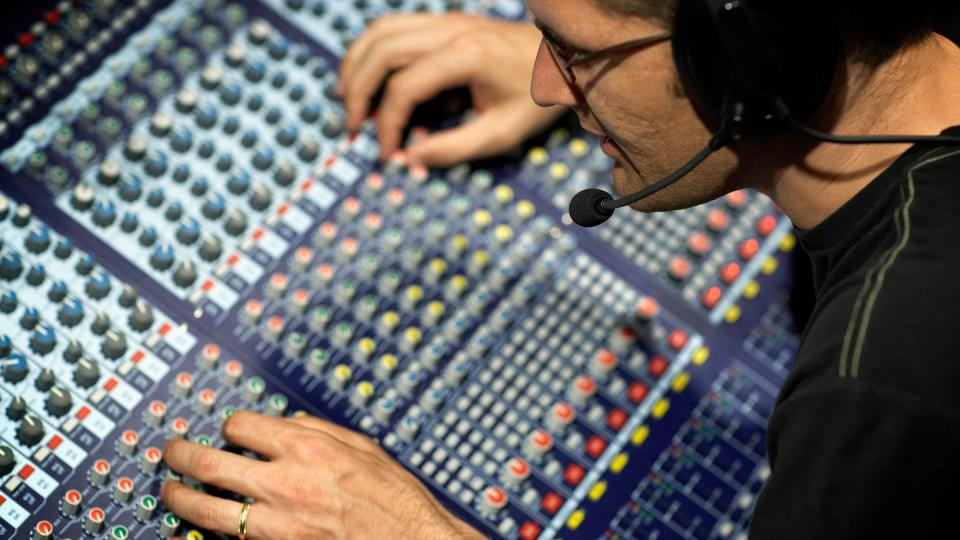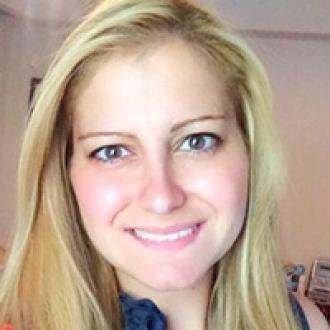- Undergraduate
Sound Engineering BSc (Hons)
Overview
Why study at the University of West London?
- Ranked 30th university in the UK - The Guardian University Guide 2025
- Number 1 London university for overall student satisfaction - National Student Survey 2024**
- Best university for Student Experience and Teaching Quality in the UK - The Times and Sunday Times Good University Guide 2024
Get a head start in your sound engineering career with this multifaceted course, which combines vocational study and academic theory.
In the first year, you will cover the fundamentals of sound, audio electronics, programming, recording and production, and critical listening. along with the mathematics that underpins all these subjects.
In the second year, we want you to dig deep into wider applications of sound engineering in different domains, immersing yourself in the tools and techniques that add depth and variety to your engineer's toolbox. We also want to see your personal vision and persona develop, to the point where you are happy to take on work outside of the university.
By the third year, you will have a huge array of marketable skills under your belt and in this final year, you will learn to apply them in a range of environments. You will also prepare a major project of your own choosing, which will present your talent to the world.
When you finish our aim is that you are not only a highly talented sound engineer but, through the reading and thinking undertaken, you will be operating at an intellectual level worthy of a University of West London graduate.
During your studies, you will have access to one of the largest audio complexes in Europe, which includes more than 20 studios, as well as teaching rooms, labs and computer suites.
Accreditation
This degree has been accredited by the Institute of Engineering and Technology under licence from the UK regulator, the Engineering Council. Accreditation is a mark of assurance that the degree meets the standards set by the Engineering Council in the UK Standard for Professional Engineering Competence (UK-SPEC).
An accredited degree will provide you with some or all of the underpinning knowledge, understanding and skills for eventual registration as an Incorporated Engineer (IEng). Some employers recruit preferentially from accredited degrees, and an accredited degree is likely to be recognised by other countries that are signatories to international accords.
Select your desired study option, then pick a start date to see relevant course information:
Start date:
If your desired start date is not available, try selecting a different study option.
Why study Sound Engineering with us?


What our students say…
The course helped me critically think what I was doing to sound at all stages of recording in both the analogue and digital domain. This helped me achieve the sounds I wanted to create.




Course detail & modules
This degree offers a balanced and varied approach to sound engineering. It will equip you with the skills and knowledge you will need to work within a variety of industries as a sound engineer.
You will combine lectures and private study with practical work that will help you to apply your learning while developing your practical skills and experience through a series of laboratory, workshop and studio sessions in our professional facilities.
As a sound engineer, it will be essential for you to work as part of a diverse team and the course will help you to examine the key collaborative, social and ethical considerations that you will likely encounter in your career.
The school has links with Audient, Focusrite and Avid, among others. These organisations help to support our guest lectures, masterclasses and student visits, adding industry input to your learning experience. We will encourage you to build links with relevant industry bodies such as the Audio Engineering Society and the Institution of Engineering and Technology. You will also have opportunities to provide technical support for the London College of Music’s live performances.
We will encourage you to apply your learning in a professional environment and past students have gained work experience in a variety of areas while studying, including:
- broadcast sound technician
- theatre sound engineer
- live sound reinforcement
- location recording engineer
- Audiology.
The London College of Music boasts excellent facilities for music performance and sound engineering, including recording studios and production resources. You will have an enviable range of equipment to practice with, including a Custom Series 75 Neve 48-channel console, Focusrite RedNet networked audio interfaces, ProTools HDX workstations, numerous synthesisers and microphones.
Compulsory modules
-
Audio Electronics
All audio hardware is designed and built upon principles of electrical theory. The processes of simple fader movements on a mixing desk to the detection of higher frequencies in a de-esser can be reduced to simple and more complex design of electronic circuits. This module will introduce these principles and help you understand what is happening underneath the control panels.
-
Quantitative Tools for Audio
This module will equip you with the fundamental tools to understand and represent problems in sound engineering subjects such as acoustics, electronics, and sound system design. Through exploring concepts like fractions, logarithms, trigonometry, and more, it emphasises the practical application of these principles for solving real-world challenges.
-
Theory of Sound
The aim of the module is for you to understand the theories and parameters relating to sound engineering that apply to all areas of the course. The main subject areas include; human hearing, physics of sound, sound measurement and decibels, basic room acoustics and digital audio conversion.
-
Studio Recording Techniques
The module will introduce you to the multitrack recording studio environment. You will develop practical skills in each stage of the production process, tracking and mixing. The module will focus on developing microphone techniques and producing musically balanced and controlled final mixes.
-
Engineering Software
The module will help you develop as programmer using C++ as a toon to build simple applications related to sound engineering. You will learn to specify, develop and test software to specified standards to meet a range of sound engineering needs.
-
Production and Critical Listening
The module is designed to introduce you to modern audio production processes and how to listen to sound in an objectively critical manner. You will study relevant hardware, digital audio workstations and MIDI sequencer packages. A programme of ear training will develop your critical listening skills on recorded sound and their musical attributes.
Compulsory modules
-
Electroacoustics
The module aims to provide you with a deep understanding of the design and performance of electroacoustic systems such as loudspeakers and microphones. You will explore and analyse the design and the behaviour of these systems and devices using theoretical analysis and industry-standard tools, software and processes.
-
Mathematics for Audio and Signal Processing
This module aims to provide you with the fundamental signal theory and enable you to use basic mathematical methods to analyse audio signals in time and frequency domains. The module will introduce you to signal analysis, including the types of signals, properties and applications of signals and conversion between analogue and digital signals by signal sampling and quantization.
-
Sound Design and Synthesis
Sound design is used in many industry sectors, including; film, TV, radio, gaming, advertising, theatre, virtual reality and smart devices. You will learn how to use synthesisers, samplers, how to record on location and how to creatively process sound files. You will apply sound design techniques to fulfil specific professional media briefs.
-
Acoustics
The module will provide a detailed understanding of the principles of acoustics. These principles will be explored in the context of studios, concert halls and public spaces. You will focus on the control of sound in a space to a required specification, and the prevention of interaction between isolated spaces.
-
Audio Electronic Design
You will explore and analyse the design of audio electronic circuits through a range of applications, such as filters, amplifiers and oscillators. You will design, simulate, build and test your own audio device based on a given specification.
-
Embedded Systems for Audio Technology
Embedded systems are those that combine computers and electrical systems, such as an audio interface. The module provides a background to embedded development, introduces open-source tools and techniques used in the audio industry to programme embedded hardware, and enables the you to gain experience in programming languages and techniques, typically used for mobile and embedded applications.
-
Live Sound Practice (non credit-bearing module)
This employability–focused module will provide you with practice experience in the field of live sound engineering. It will involve engaging in live sound engineering experiences and producing a portfolio.
This module will carry zero credits and it will serve as a way for you to gain hands-on experience and industry practice in the various aspects of live sound.
Compulsory modules
-
Sound System Design
This module will give you a detailed understanding of a range of PA sound system types and how they behave in settings such as theatres, halls and public spaces. The module will explore the latest technologies available, the requirements of a variety of acoustic spaces and will investigate how to develop solutions and best practices for an optimum design.
-
Audio Digital Signal Processing
You will be introduced to the fundamentals of digital signal processing. This knowledge will then be applied to audio as both a tool for developing audio effects but also for audio analysis. You will learn how to develop your own adaptive digital audio effect. Additionally, the module will look at convolution, filter design and audio restoration.
-
Mixing for Screen and Broadcast
This module will develop on and off specialisms in mixing to an advanced level, the module provides a practice-based context for the application, evolution and acquisition of advanced mixing techniques for a variety of platforms and format-setting applications, to allow the student to manage and troubleshoot technical issues and provide appropriate technical solutions for the master mix.
-
Audio Programming for Games
Gaming is a fast-growing and lucrative area of the entertainment industry. By the end of the module, you will have a solid appreciation of the power of audio for games, combined with the skills to develop audio assets and implement them in middleware. This in turn will form the basis of a show-reel which can be used for future promotion and collaboration within the gaming industry.
-
Sound Engineering Project
The aim of the final major project is for you to develop the ability to undertake a large-scale project in sound engineering, which allows you to apply your knowledge and skills developed throughout the course in an expansive and challenging manner. This is an opportunity for you to showcase your academic as well as practical subject skills in a manner that will help you showcase your abilities to a future employer or academic institution. Ultimately, leading you into your chosen career as a sound engineer.
Entry requirements
These can include:
- A Levels at grade B, B and C, or above
- BTEC Extended Diploma with Distinction, Merit, Merit
- Access to HE Diploma
You also need GCSE English (grade 9 – 4 / A* - C) or Level 2 equivalents and GCSE Maths (grade 9 – 5 / A* - B) or Level 2 equivalents.
Looking for BSc (Hons) Sound Engineering with Foundation Year?
Mature applicants (aged 21+): If you do not hold the qualifications listed but have relevant work experience, you are welcome to apply. Your application will be considered on an individual basis.
Level 5 (year 2) entry
To directly enter the second year of this course you will need to show appropriate knowledge and experience. For example, you are an ideal candidate if you have 120 undergraduate credits at Level 4 or a CertHE in a related subject area.
Level 6 (year 3) entry
To directly enter the third year of this course you need to show appropriate knowledge and experience. For example, you are an ideal candidate if you have 240 undergraduate credits (at Levels 4 and 5), a DipHE, Foundation Degree or HND in a related subject area.
Looking for BSc (Hons) Sound Engineering with Foundation Year?
You need to meet our English language requirement - a minimum of IELTS 5.5 for each of the 4 individual components (Reading, Writing, Speaking and Listening). Visit our English language requirements page for information on other English language tests we accept.
You also need academic qualifications at the same level as UK applicants. In some countries where teaching is in English, we may accept local qualifications. Check for local equivalents.
We offer pre-sessional English language courses if you do not meet these requirements.
Looking for BSc (Hons) Sound Engineering with Foundation Year?
Mature applicants (aged 21+): If you do not hold the qualifications listed but have relevant work experience, you are welcome to apply. Your application will be considered on an individual basis.
Level 5 (year 2) entry
To directly enter the second year of this course you will need to show appropriate knowledge and experience. For example, you are an ideal candidate if you have 120 undergraduate credits at Level 4 or a CertHE in a related subject area.
Level 6 (year 3) entry
To directly enter the third year of this course you need to show appropriate knowledge and experience. For example, you are an ideal candidate if you have 240 undergraduate credits (at Levels 4 and 5), a DipHE, Foundation Degree or HND in a related subject area.
Looking for BSc (Hons) Sound Engineering with Foundation Year?
Fees & funding
Please note:
- Fees for the 2026/27 academic year and onwards may be subject to Government regulation and change.
- Tuition fees are charged for each year of your course. If your course runs for two years or more, you will need to pay the fee for each academic year at the start of that year.
- If your course runs for less than two years, the cost above is for your full course and you will need to pay the full fee upfront.
- If no fee is shown above then the fees for this course are not available yet. Please check again later for updates.
Funding your studies
You may be eligible for a student loan to cover the cost of tuition fees, or a maintenance loan. Additional funding is available to some types of students, such as those with dependants and disabled students.
We offer generous bursaries and scholarships to make sure your aspirations are your only limit. In recent years, hundreds of students have received our Full-time Undergraduate Student Bursary.
Additional scholarships specifically for computing and engineering students are also on offer.
View full details, including conditions and eligibility.
Please note:
- Fees for the 2026/27 academic year and onwards may be subject to Government regulation and change.
- Tuition fees are charged for each year of your course. If your course runs for two years or more, you will need to pay the fee for each academic year at the start of that year.
- If your course runs for less than two years, the cost above is for your full course and you will need to pay the full fee upfront.
- If no fee is shown above then the fees for this course are not available yet. Please check again later for updates.
International students - funding your studies
We offer scholarships for international students including International Ambassador Scholarships.
Further information about funding and financial support for international students is available from the UK Council for International Student Affairs.
Teaching staff

Dr Eugenio Donati
I am a Lecturer in Audio/Sound Engineering and I have a PhD in Audio Electronics and Bio-signal processing. My doctoral thesis focused on the development of a system for the conversion of voice into MIDI through the application of biosignal and Artificial Intelligence. I am a member of the Institution of Engineering and Technology (IET) and of the UK Acoustic Network (UKAN+).
I am a Lecturer in Audio/Sound Engineering and I have a PhD in Audio Electronics and Bio-signal processing. My doctoral thesis focused on the development of a system for the conversion of voice into MIDI through the application of biosignal and Artificial Intelligence. I am a member of the Institution of Engineering and Technology (IET) and of the UK Acoustic Network (UKAN+).
Study & career progression

Once you graduate you could go on to work in:
- studio recording engineering
- computer music and synthesis
- live sound recording and engineering
- sound system design
- field service engineering
- acoustic consultancy (installation)
- design and test engineering for audio hardware and software
- theatre sound engineering
- sound designer and audio post production
- audiology, broadcast engineering and production.
You may also want to progress your studies to explore a related field or specialise on a postgraduate course.
How to apply

Head to the UCAS website where you can apply using:
- our institution code - W05
- the UCAS course code (below)
Want to ask us a question first? We would love to hear from you. Contact us free on:
Apply for this course
- Institution code
- W05
- UCAS code
- currentVariantData.field_p_cv_ucas_code
Next steps after making your application
We aim to make a decision on your application as quickly as we can. If we need any more information about your qualifications, we will be in touch.
In the meantime, come and visit us and find out more about what studying at UWL is like. Sign up for an open day or join a campus tour.
Visit us and see for yourself
Talk to our tutors and find out about our courses and facilities at our next open day or join a campus tour.
Our prospectus
All of our courses in one place - download now or order a hard copy.
We're here to help
Any questions about a course or studying at UWL? We're here to help - call us on 0800 036 8888 (option 2, Monday – Friday 10am-4pm) or email us on courses@uwl.ac.uk.

You can apply online at any time by following the link below.
Our application form will ask you for some information about what you want to study, your previous qualifications or experience, and how we can contact you.
Want to ask us a question first? We would love to hear from you. Contact us free on:
- 0800 036 8888
- courses@uwl.ac.uk
Apply for this course
Next steps after making your application
We aim to make a decision on your application as quickly as we can. If we need any more information about your qualifications, we will be in touch.
In the meantime, come and visit us and find out more about what studying at UWL is like. Sign up for an open day or join a campus tour.
Visit us and see for yourself
Talk to our tutors and find out about our courses and facilities at our next open day or join a campus tour.
Our prospectus
All of our courses in one place - download now or order a hard copy.
We're here to help
Any questions about a course or studying at UWL? We're here to help - call us on 0800 036 8888 (option 2, Monday – Friday 10am-4pm) or email us on courses@uwl.ac.uk.

You can apply to us in two ways:
- on the UCAS website you will need our institution code (W05) and the UCAS course code (at the top of this page)
- directly on our website – follow the ‘apply now’ link below
Want to ask us a question first? Our dedicated international students’ team would love to hear from you.
- Ask the International Recruitment Team a question
- learn more about international student applications
- find out more about why you should study in London at the Career University.
Apply for this course
Next steps after making your application
We aim to make a decision on your application as quickly as we can. If we need any more information about your qualifications, we will be in touch.
In the meantime, come and visit us and find out more about what studying at UWL is like. Sign up for an open day or join a campus tour.
Visit us and see for yourself
Talk to our tutors and find out about our courses and facilities at our next open day or join a campus tour.
Our prospectus
All of our courses in one place - download now or order a hard copy.
We're here to help
Any questions about a course or studying at UWL? We're here to help - call us on 0800 036 8888 (option 2, Monday – Friday 10am-4pm) or email us on courses@uwl.ac.uk.
Search for courses
Student life at UWL
Important notes for applicants
Disclaimer
*Modern universities - defined as higher education institutions that were granted university status in, and subsequent to, 1992.
**The National Student Survey 2023 and 2024 - Average of answers to all questions by registered student population. Excludes specialist institutions.
Testimonials - our students or former students provided all of our testimonials - often a student from the course but sometimes another student. For example, the testimonial often comes from another UWL student when the course is new.
Optional modules - where optional modules are offered they will run subject to staff availability and viable student numbers opting to take the module.
Videos - all videos on our course pages were accurate at the time of filming. In some cases a new Course Leader has joined the University since the video was filmed.
Availability of placements - if you choose a course with placement/internship route we would like to advise you that if a placement/internship opportunity does not arise when you are expected to undertake the placement then the University will automatically transfer you to the non-internship route, this is to ensure you are still successful in being awarded a degree.









